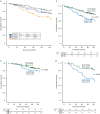The relationship between tumour stroma percentage, the tumour microenvironment and survival in patients with primary operable colorectal cancer
- PMID: 24458470
- PMCID: PMC4433525
- DOI: 10.1093/annonc/mdt593
The relationship between tumour stroma percentage, the tumour microenvironment and survival in patients with primary operable colorectal cancer
Abstract
Background: Tumour stroma percentage (TSP) has previously been reported to predict survival in patients with colorectal cancer (CRC); however, whether this is independent of other aspects of the tumour microenvironment is unknown. In the present study, the relationship between TSP, the tumour microenvironment and survival was examined in patients undergoing elective, curative CRC resection.
Patients and methods: Patients undergoing resection at a single centre (1997-2008) were identified from a prospective database. TSP was measured at the invasive margin and its association with cancer-specific survival (CSS) and clinicopathological characteristics examined.
Results: Three hundred and thirty-one patients were included in the analysis. TSP was associated with CSS in patients with stage I-III disease [hazard ratio (HR) 1.84, 95% confidence interval (CI) 1.17-2.92, P = 0.009], independent of age, systemic inflammation, N stage, venous invasion and Klintrup-Mäkinen score. Furthermore, TSP was associated with reduced CSS in patients with node-negative disease (HR 2.14, 95% CI 1.01-4.54, P = 0.048) and those who received adjuvant chemotherapy (HR 2.83, 95% CI 1.23-6.53, P = 0.015), independent of venous invasion and host inflammatory responses. TSP was associated with several adverse pathological characteristics, including advanced T and N stage. Furthermore, TSP was associated with an infiltrative invasive margin and inversely associated with necrosis.
Conclusions: The TSP was a significant predictor of survival in patients undergoing elective, curative CRC resection, independent of adverse pathological characteristics and host inflammatory responses. In addition, TSP was strongly associated with local tumour growth and invasion.
Keywords: colorectal cancer; survival; tumour microenvironment; tumour stroma.
Figures


References
-
- UK CR. Bowel Cancer Mortality Statistics. UK: Cancer Research UK; http://info.cancerresearchuk.org/cancerstats/types/bowel/mortality. 3 April 2013, 1 June 2013.
-
- Oliphant R, Nicholson GA, Horgan PG, et al. Deprivation and colorectal cancer surgery: longer-term survival inequalities are due to differential postoperative mortality between socioeconomic groups. Ann Surg Oncol. 2013;20:2132–2139. - PubMed
-
- Horgan PG, McMillan DC. Surgeons and selection of adjuvant therapy for node‐negative colonic cancer. Br J Surg. 2010;97:1459–1460. - PubMed
-
- Richards CH, Roxburgh CS, Anderson JH, et al. Prognostic value of tumour necrosis and host inflammatory responses in colorectal cancer. Br J Surg. 2012;99:287–294. - PubMed
-
- Roxburgh CSD, McMillan DC. The role of the in situ local inflammatory response in predicting recurrence and survival in patients with primary operable colorectal cancer. Cancer Treat Rev. 2012;38:451–466. - PubMed
MeSH terms
LinkOut - more resources
Full Text Sources
Other Literature Sources
Medical
Molecular Biology Databases
Miscellaneous

